The island of Korcula (Latin name: Corcyra Nigra) is the island in central Dalmatian archipelago and it belongs to Dubrovnik Neretva County.
Without any doubt, Korcula is one of the most interesting places in Croatia, in a historical, monumental, touristic way, and it is distinguished even by its vegetation.
It is the third most thickly wooded islands in Croatia, after Lopud and Mljet.
That was even a base for its Latin name.
The three largest villages on the island of Korcula are Vela Luka in the west of the island, Blato in the interior, and the city of Korcula in the east. Other places are: Lumbarda, Pupnat Zrnovo, Cara, Smokvica and Racisce, Banja, Vrbovica, Babina, Prigradica, Zavalatica, Rasohatica, Orlanduša, Tri luke, Pupnatska luka, Prizba, Zaglav, Brna...
Wide panoramic views, mild Mediterranean climate, clear blue sea, preserved natural beauties, fresh air, amazing cultural and historical heritage, and above all, warm-hearted and hospitable local people make this island attractive tourist destination.
There are many stories and legends related to the island of Korcula.
There are also may monuments that testify to some of them. The oldest written monument in Croatia was found in small town Lumbarda. It was called: 'Lumbardska psefizma' and it was written in Greek.
According to the legend, Korcula was founded in 12th Century BC by Trojan hero Anthenor.
There are written evidences of rich social life here in 13th Century. The 'Statue of Korcula' talked about the management an order of the town.
It was effective till early 19th Century, when French authority arrived.
At the end of 13th Century, in the channel near Korcula, was battle between the Venice and Genoa navies.
The story said that famous travel writer Marco Polo was involved. According to some sources, Marco Polo was born in Korcula.
Today it is possible to see and visit the house of Marco Polo in town of Korcula.
During the history, people here were mostly the stonemasters and shipbuilders, and seamen.
All over the Dalmatia there are sculptures and buildings done by Korcula's stoneworkers.
Anyway, the magnum opus is on the island.
There are late Gothic, Renaissance, and Baroque examples, but the most valuable one is the Cathedral of st. Marco that took 150 years to be finished.
The town of Korcula's streets laid out in right herring-bone form.
During its rich history, it passed many battles.
Today, each summer, there are the Moreska dance nights in Korcula and Kumpanija dance in Blato.
The Moreska dance evokes the battle with the Moors.
The dancers wear black and white costumes and represents good and evil.
Kumpanija (Company) dance in Blato symbolise the fight for freedom.







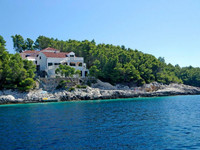
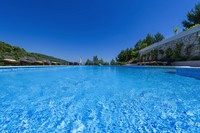
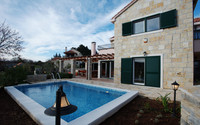
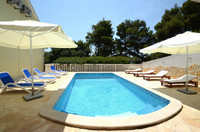

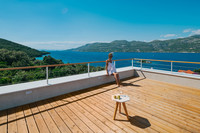

If you have a question, please feel free to ask it.
No comment yet